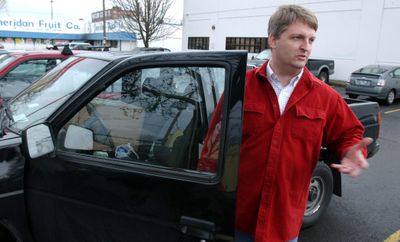Tax on mileage gets close look
Privacy, impact on fuel efficiency among concerns

PORTLAND – Oregon is among a growing number of states exploring ways to tax drivers based on the number of miles they drive instead of how much gas they use, even going so far as to install GPS monitoring devices in 300 vehicles.
The idea first emerged nearly 10 years ago as Oregon lawmakers worried that fuel-efficient cars such as gas-electric hybrids could pose a threat to road upkeep, which is paid for largely with gasoline taxes.
“I’m glad we’re taking a look at it before the potholes get so big that we can’t even get out of them,” said Leroy Younglove, a Portland driver who participated in a recent pilot program.
The proposal is not without critics, including drivers who are concerned about privacy and others who fear the tax could eliminate the financial incentive for buying efficient vehicles.
But Oregon is ahead of the nation in exploring the concept, even though it will probably be years before any mileage tax is adopted.
Congress is talking about it, too. A congressional commission has envisioned a system similar to the prototype Oregon tested in 2006-2007.
The National Commission on Surface Transportation Infrastructure Financing is considering calling for higher gas taxes to keep highways, bridges and transit programs in good shape.
But over the long term, commission members say, the nation should consider taxing mileage rather than gasoline as drivers use more fuel-efficient and electric vehicles.
Governors in Idaho and Rhode Island have considered systems that would require drivers to report their mileage when they register vehicles.
In North Carolina last month, a panel suggested charging motorists a quarter-cent for every mile as a substitute for the gas tax.
James Whitty, the Oregon Department of Transportation employee in charge of the state’s effort, said he’s also heard talk of mileage tax proposals in Ohio, Pennsylvania, Florida, Colorado and Minnesota.
In Oregon’s pilot program, officials equipped 300 vehicles with GPS transponders that worked wirelessly with service station pumps, allowing drivers to pay their mileage tax just as they do their gas tax.
Whitty said the test, which involved two gas stations in the Portland area, proved the idea could work.
Though the GPS devices did not track the cars’ locations in great detail, they could determine when a driver had left certain zones, such as the state of Oregon. They also kept track of the time the driving was done, so a premium could be charged for rush-hour mileage.
While the mileage tax raises privacy concerns, Whitty said he and his task force have assured people that the program does not track detailed movement and that driving history is not stored and cannot be accessed by law enforcement agencies.
“I think most people will come to realize there is really no tracking issue and will continue to buy new cars,” Whitty said, noting that many cell phones now come equipped with GPS, which has not deterred customers.
Others are worried that a mileage tax would undermine years of incentives to switch toward more fuel-efficient vehicles.
“It doesn’t seem fair,” said Paul Niedergang, of Portland, that a hybrid would be taxed as much as his Dodge pickup. “I just think the gas tax needs to be updated.”